Related Research Articles

Frans Eemil Sillanpää was a Finnish author. In 1939, he became the first Finnish writer to be awarded the Nobel Prize for Literature "for his deep understanding of his country's peasantry and the exquisite art with which he has portrayed their way of life and their relationship with Nature".
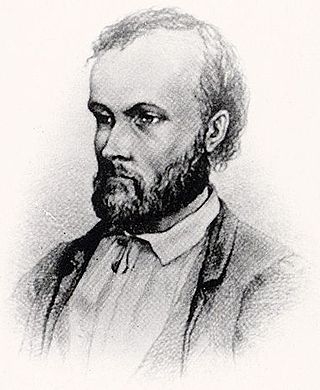
Aleksis Kivi was a Finnish writer who wrote the first significant novel in the Finnish language, Seitsemän veljestä, published in 1870. He is also known for his 1864 play, Nummisuutarit. Although Kivi was among the very earliest writers of prose and lyrics in Finnish, he is still considered one of the greatest.
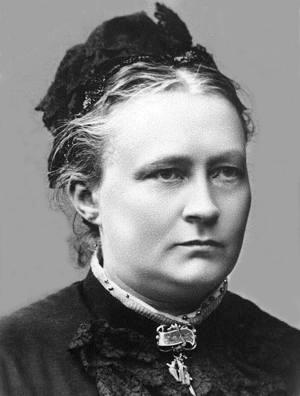
Minna Canth was a Finnish writer and social activist. Canth began to write while managing her family draper's shop and living as a widow raising seven children. Her work addresses issues of women's rights, particularly in the context of a prevailing culture she considered antithetical to permitting expression and realization of women's aspirations. The Worker's Wife and The Pastor's Family are her best known plays, but the play Anna Liisa is the most adapted to the films and operas. In her time, she became a controversial figure, due to the asynchrony between her ideas and those of her time, and in part due to her strong advocacy for her point of view.

Finnish literature refers to literature written in Finland. During the European early Middle Ages, the earliest text in a Finnic language is the unique thirteenth-century Birch bark letter no. 292 from Novgorod. The text was written in Cyrillic and represented a dialect of Finnic language spoken in Russian Olonets region. The earliest texts in Finland were written in Swedish or Latin during the Finnish Middle Age. Finnish-language literature was slowly developing from the 16th century onwards, after written Finnish was established by the Bishop and Finnish Lutheran reformer Mikael Agricola (1510–1557). He translated the New Testament into Finnish in 1548.

Simo Tapio Puupponen, better known by the pen name Aapeli, was a Finnish writer and novelist.
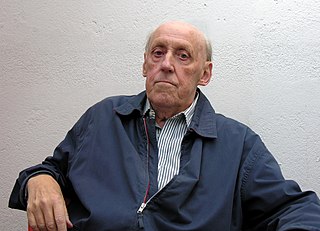
Baron Bo Gustaf Bertelsson Carpelan was a Finland-Swedish poet and author. He published his first book of poems in 1946, and received his PhD in 1960. Carpelan, who wrote in Swedish, composed numerous books of verse, as well as several novels and short stories.
Tammi, also known as Kustannusyhtiö Tammi and Tammi Publishers, is a Finnish publishing company established in 1943 by an initiative of Väinö Tanner, leader of the Social Democratic Party of Finland. In 1996, the company was bought by the Bonnier Group, and, as of the early 2000s, it was the third largest book publisher in Finland. In 2018, the company was merged into the Finnish book publishing company Werner Söderström Osakeyhtiö (WSOY). Tammi was formerly known as Kustannusosakeyhtiö Tammi.

Wivi Lönn, born as Olivia Mathilda Lönn, was a Finnish architect. She was the first woman to be awarded the honorary title of "Professor" by the Finnish Association of Architects.

Arvo Albin Turtiainen was a Finnish writer and translator.
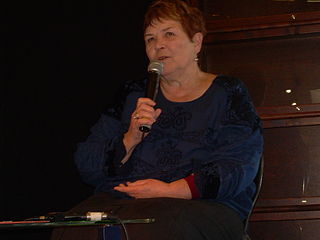
Kaisa Korhonen is a Finnish singer, actor, theatre director and writer. She was a central figure in the Finnish leftist music scene of the 60s and 70s, appearing both as a solo artist, and with KOM-teatteri. After her singing career, Korhonen has become an accomplished director and teacher of theatre directing.
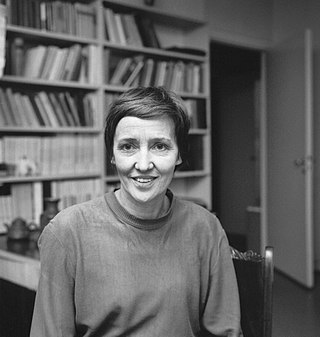
Elvi Aulikki Sinervo was a Finnish writer, poet, and translator. She was the recipient of the Eino Leino Prize in 1980. She married member of parliament Mauri Ryömä (1911–58). Their daughter is translator Liisa Ryömä.

Olli Jalonen (born February 21, 1954 in Helsinki, is a Finnish author. His debut book was published in 1978 and since that he has published over 20 books and drama. Some of his novels have been translated into German, Swedish, Norwegian, Estonian and Latvian, and short stories in different languages.
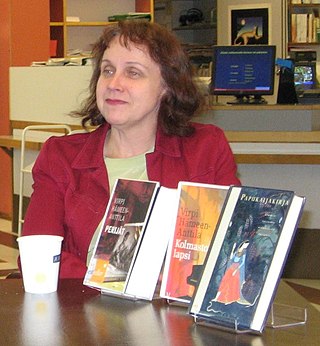
Virpi Hämeen-Anttila is a Finnish writer, translator, and researcher. She was the recipient of the Eino Leino Prize in 2002 along with her husband Jaakko Hämeen-Anttila, for their work in translating and promoting multicultural literature. In addition to being a best-selling novelist, she is a translator and non-fiction writer. She also teaches Sanskrit and the history of Indian art at Helsinki University.
The European Union Prize for Literature (EUPL), established in 2009, is a European Union literary award. Its aim is to recognise outstanding new literary talents from all over Europe, to promote the circulation and translation of literature amongst European countries, and to highlight the continent's creativity and diversity.
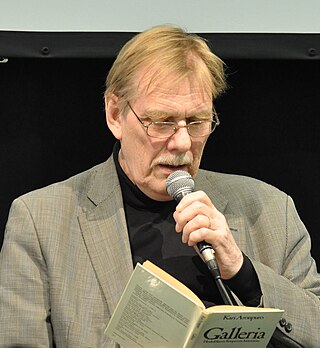
Kari Aronpuro is a Finnish poet. He worked in the library industry for over 40 years. He worked as a librarian at the University of Tampere course library from 1964 to 1971, Rääkkylän municipal library in 1972, Kemin Syväkangas library from 1972 to 1981 and the Tampere Lamminpää library from 1981 to 2003.
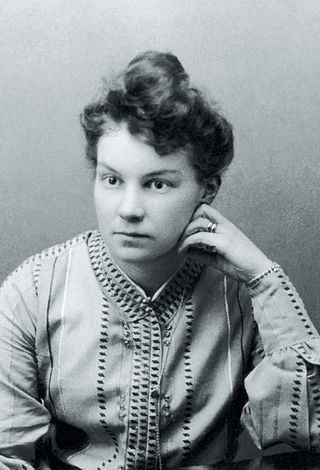
L. Onerva was a Finnish poet. Onerva also wrote short stories and novels and worked as a translator and critic. In her works, she often dealt with tension in women's lives concerning freedom and commitment. She is also remembered for her complicated relationship with Eino Leino, as well as her marriage to the composer Leevi Madetoja.
Marjatta Hietala is a Finnish historian specialising in urban history and the history of innovations. She is professor emerita of General History at the University of Tampere.
Anne-Maria Laukkanen is a Finnish researcher (1990–) and a permanent full professor (2001–) of speech technique and vocology at the University of Tampere.
Kairi Look is an Estonian children’s writer and author of short prose.
References
- ↑ "Piia Leino". European Union Prize for Literature. Archived from the original on 2020-01-27. Retrieved 2019-08-10.
- ↑ "Onnea, Piia Leino!". S&S. 2017-03-06. Retrieved 2021-12-30.
- ↑ Bio